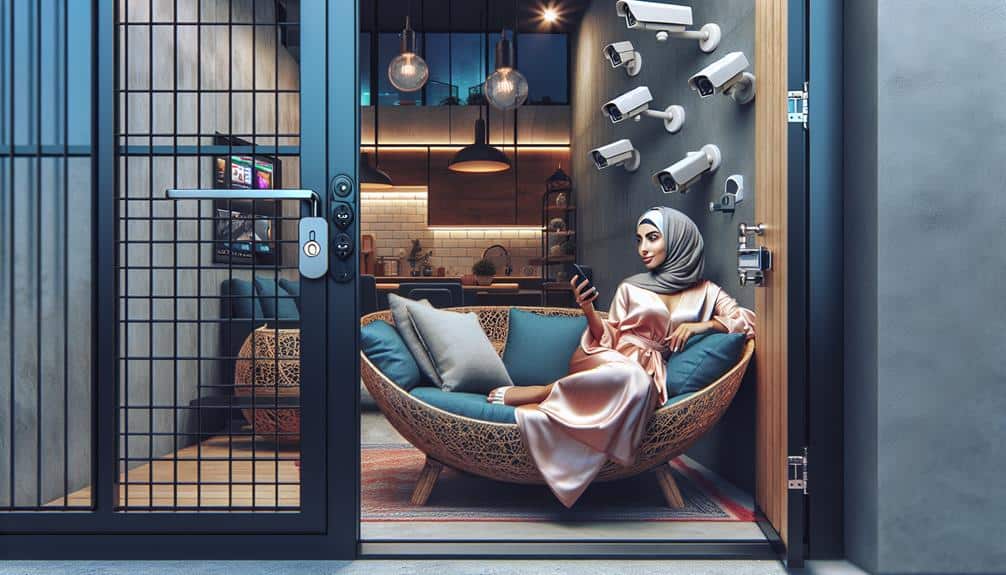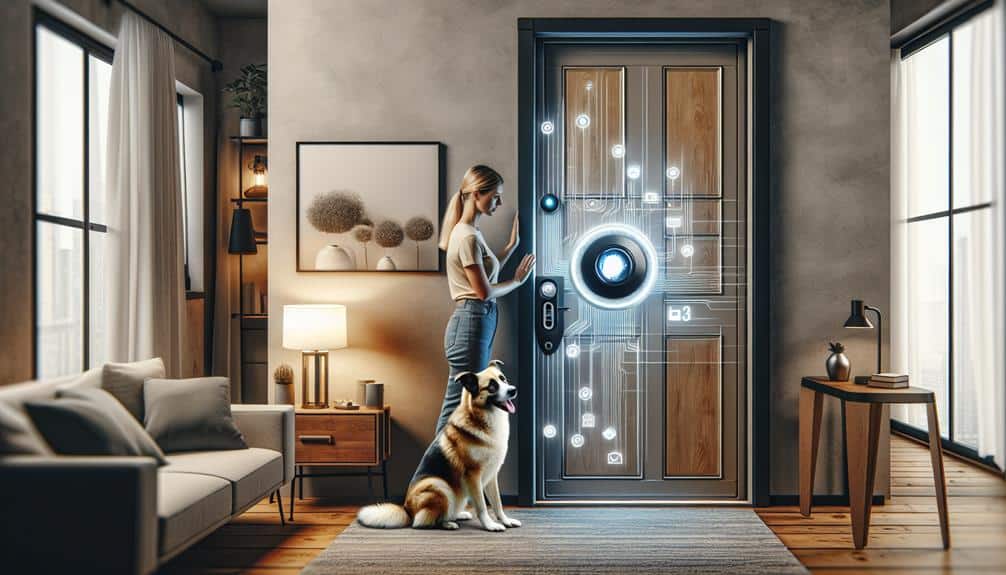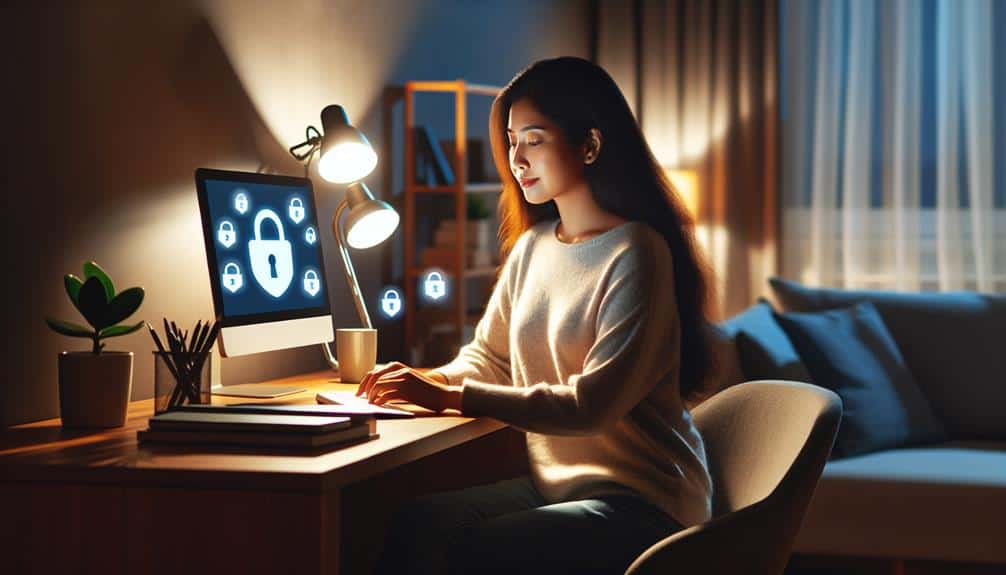Stay Safe and Secure: Top Strategies for Women Living Solo

Living solo as a woman can be both empowering and safe when you implement effective strategies. Secure your home with high-quality locks, a reliable security system, and motion sensor lights. Always lock doors and windows, verify visitors, and carry self-defense tools like pepper spray. Protect your online privacy by using strict social media settings and secure passwords. Build a strong support network with regular check-ins and by joining community safety groups. Consider enrolling in self-defense classes to boost your confidence and safety skills. For more tips and detailed strategies, there’s plenty more to explore.
Key Takeaways
- Install high-quality locks on all doors and windows and use a reliable home security system.
- Consistently lock doors and windows and verify visitors through peepholes or video doorbells.
- Set strict privacy settings on social media and use secure, unique passwords.
- Establish regular check-ins with trusted friends, family, and neighbors for added security.
- Enroll in self-defense classes and carry self-defense tools like pepper spray.
Home Security Tips

Securing your home effectively involves installing high-quality locks on all doors and windows. This fundamental step ensures that unauthorized entry is significantly more difficult, giving you peace of mind and reinforcing your personal safety, especially when living alone. High-quality locks are your first line of defense, but they’re just the beginning.
To truly feel secure, consider investing in a reliable home security system. Such systems often include surveillance cameras and motion sensor lights, which provide an additional layer of protection. Motion sensor lights around your front door and other entry points can deter potential intruders by illuminating any suspicious activity.
Smart home devices, like video doorbells, allow you to monitor and control access to your home remotely. This is particularly useful for women living alone, as you can see who’s at your door before you open it. Regularly changing security codes and passwords further strengthens your security measures, ensuring your safety protocols remain robust.
Personal Safety Habits
Locking doors and windows consistently, both when you’re at home and when you leave, is a fundamental personal safety habit. Always lock all entry points to prevent unauthorized access. This small action can drastically enhance your safety.
Develop a habit of checking peepholes or using a video doorbell before opening the door to strangers. This ensures you’re aware of who’s at your door, adding an extra layer of security. Keep your emergency contacts readily available and inform a trusted individual of your whereabouts, especially when heading to unfamiliar locations.
Prioritize situational awareness by staying alert to your surroundings. Trust your instincts; if something feels off, it probably is. Carrying self-defense tools, like pepper spray, can also enhance personal safety. Consider taking self-defense classes to prepare for potential threats, boosting your confidence and ability to respond effectively.
Here’s a quick reference table to help solidify these personal safety habits:
| Habit | Action | Benefit |
|---|---|---|
| Always lock | Lock doors and windows | Prevents unauthorized entry |
| Check peepholes | Verify who’s at your door | Enhances awareness and security |
| Emergency contacts | Keep contacts handy and inform trusted individuals | Quick help in emergencies |
| Situational awareness | Stay alert to surroundings | Detects and avoids potential threats |
| Self-defense tools | Carry items like pepper spray | Provides means of defense |
| Self-defense classes | Enroll in classes | Builds confidence and preparedness |
Online Privacy Measures

Taking steps to protect your online privacy is crucial in today’s digital age. Start by setting strict privacy settings on all your social media platforms. Ensure that only trusted friends and family can see your posts, photos, and personal information. This minimizes the risk of unwanted attention and data breaches.
Next, use secure, unique passwords for each of your online accounts. Avoid using easily guessable information like birthdays or simple sequences. Implementing a password manager can help you keep track of complex passwords and enhance your hacking prevention efforts.
Be very cautious about sharing personal information online, especially on public forums and social media. Cybercriminals often target these platforms to gather data. Always verify the source before clicking on any links, as suspicious links can lead to malware or phishing sites.
When connecting to public Wi-Fi, it’s wise to use a virtual private network (VPN) for added security. A VPN encrypts your online activities, making it harder for hackers to intercept your data.
Building a Support Network
Beyond safeguarding your online presence, it’s important to focus on building a robust support network for your overall safety and well-being. Start by establishing regular check-ins with trusted friends, family, and neighbors. These relationships can help ensure someone is always aware of your whereabouts and can offer assistance if needed.
Make sure to exchange emergency contact information with your neighbors for quick help in case of an emergency.
Joining local community groups focused on personal safety can also be a valuable step. These groups keep you informed about local safety concerns and connect you with like-minded individuals dedicated to mutual support.
Inform your support network about your living situation and share important contact details. Knowing the specifics of your daily routine and key contacts can be crucial in emergencies.
Building relationships with those around you not only fosters a sense of community but also adds an extra layer of security.
Your support network is more than a safety measure; it’s a foundation for peace of mind. By integrating these strategies, you enhance your personal safety and create a supportive environment that makes solo living both empowering and secure.
Self-Defense Techniques
Mastering self-defense techniques empowers you to protect yourself in potentially dangerous situations. These skills not only improve your personal safety but also boost your confidence. Whether you’re using pepper spray, stun guns, or martial arts, being prepared can deter potential attackers and give you the upper hand.
To get started, consider enrolling in self-defense classes. These classes teach practical skills and strategies tailored to real-world scenarios. You’ll learn how to effectively use tools like pepper spray and stun guns, as well as basic martial arts moves that can help you escape or incapacitate an attacker.
Here’s a breakdown of essential self-defense techniques and tools:
| Technique/Tool | Benefits |
|---|---|
| Pepper Spray | Easy to carry, quick deterrent |
| Stun Guns | Immediate incapacitation |
| Martial Arts | Physical and mental discipline |
| Self-Defense Classes | Hands-on training, confidence boost |
Frequently Asked Questions
How Can a Woman Stay Safe While Living Alone?
Install a robust home security system, take self-defense classes, and always share your travel plans with trusted friends. Keep emergency contacts handy, lock doors consistently, avoid oversharing online, and stay cautious when meeting strangers.
How Can a Woman Keep Herself Safe?
You can enhance your safety by installing high-quality door locks and a security system. Regularly change security codes, use personal safety apps, and take self-defense classes. Always keep emergency contacts handy and prioritize your mental health.
How to Feel Safe Home Alone at Night as a Woman?
To feel safe home alone at night, ensure doors and windows are locked, use a reliable security system, and set timers on lights or TV. Consider taking self-defense classes and have emergency contacts and a safety plan ready.
How to Stay Safe When Home Alone?
To stay safe when home alone, install a peephole or video doorbell for visitor verification, keep emergency contacts handy, use safety apps, lock doors and windows, and join local community groups or neighborhood watch programs.


I like this website it’s a master piece! Glad I discovered this ohttps://69v.topn google.Blog monry